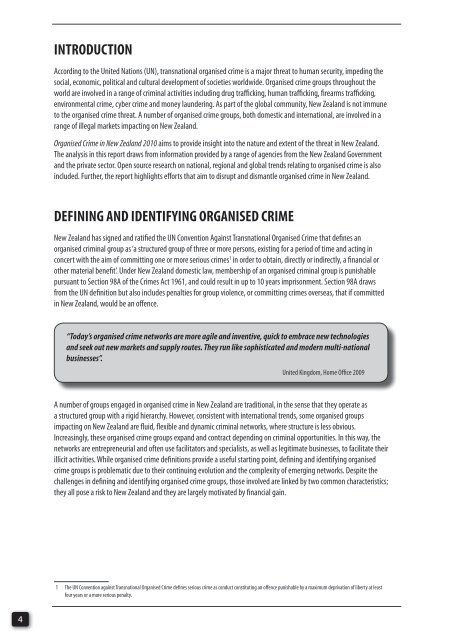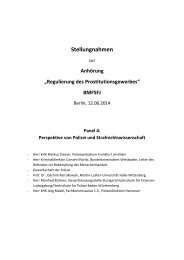Organised-Crime-in-NZ-2010-Public-Version
Organised-Crime-in-NZ-2010-Public-Version
Organised-Crime-in-NZ-2010-Public-Version
You also want an ePaper? Increase the reach of your titles
YUMPU automatically turns print PDFs into web optimized ePapers that Google loves.
INTRODUCTION<br />
Accord<strong>in</strong>g to the United Nations (UN), transnational organised crime is a major threat to human security, imped<strong>in</strong>g the<br />
social, economic, political and cultural development of societies worldwide. <strong>Organised</strong> crime groups throughout the<br />
world are <strong>in</strong>volved <strong>in</strong> a range of crim<strong>in</strong>al activities <strong>in</strong>clud<strong>in</strong>g drug traffick<strong>in</strong>g, human traffick<strong>in</strong>g, firearms traffick<strong>in</strong>g,<br />
environmental crime, cyber crime and money launder<strong>in</strong>g. As part of the global community, New Zealand is not immune<br />
to the organised crime threat. A number of organised crime groups, both domestic and <strong>in</strong>ternational, are <strong>in</strong>volved <strong>in</strong> a<br />
range of illegal markets impact<strong>in</strong>g on New Zealand.<br />
<strong>Organised</strong> <strong>Crime</strong> <strong>in</strong> New Zealand <strong>2010</strong> aims to provide <strong>in</strong>sight <strong>in</strong>to the nature and extent of the threat <strong>in</strong> New Zealand.<br />
The analysis <strong>in</strong> this report draws from <strong>in</strong>formation provided by a range of agencies from the New Zealand Government<br />
and the private sector. Open source research on national, regional and global trends relat<strong>in</strong>g to organised crime is also<br />
<strong>in</strong>cluded. Further, the report highlights efforts that aim to disrupt and dismantle organised crime <strong>in</strong> New Zealand.<br />
DEFINING AND IDENTIFYING ORGANISED CRIME<br />
New Zealand has signed and ratified the UN Convention Aga<strong>in</strong>st Transnational <strong>Organised</strong> <strong>Crime</strong> that def<strong>in</strong>es an<br />
organised crim<strong>in</strong>al group as ‘a structured group of three or more persons, exist<strong>in</strong>g for a period of time and act<strong>in</strong>g <strong>in</strong><br />
concert with the aim of committ<strong>in</strong>g one or more serious crimes 1 <strong>in</strong> order to obta<strong>in</strong>, directly or <strong>in</strong>directly, a f<strong>in</strong>ancial or<br />
other material benefit’. Under New Zealand domestic law, membership of an organised crim<strong>in</strong>al group is punishable<br />
pursuant to Section 98A of the <strong>Crime</strong>s Act 1961, and could result <strong>in</strong> up to 10 years imprisonment. Section 98A draws<br />
from the UN def<strong>in</strong>ition but also <strong>in</strong>cludes penalties for group violence, or committ<strong>in</strong>g crimes overseas, that if committed<br />
<strong>in</strong> New Zealand, would be an offence.<br />
“Today’s organised crime networks are more agile and <strong>in</strong>ventive, quick to embrace new technologies<br />
and seek out new markets and supply routes. They run like sophisticated and modern multi-national<br />
bus<strong>in</strong>esses”.<br />
United K<strong>in</strong>gdom, Home Office 2009<br />
A number of groups engaged <strong>in</strong> organised crime <strong>in</strong> New Zealand are traditional, <strong>in</strong> the sense that they operate as<br />
a structured group with a rigid hierarchy. However, consistent with <strong>in</strong>ternational trends, some organised groups<br />
impact<strong>in</strong>g on New Zealand are fluid, flexible and dynamic crim<strong>in</strong>al networks, where structure is less obvious.<br />
Increas<strong>in</strong>gly, these organised crime groups expand and contract depend<strong>in</strong>g on crim<strong>in</strong>al opportunities. In this way, the<br />
networks are entrepreneurial and often use facilitators and specialists, as well as legitimate bus<strong>in</strong>esses, to facilitate their<br />
illicit activities. While organised crime def<strong>in</strong>itions provide a useful start<strong>in</strong>g po<strong>in</strong>t, def<strong>in</strong><strong>in</strong>g and identify<strong>in</strong>g organised<br />
crime groups is problematic due to their cont<strong>in</strong>u<strong>in</strong>g evolution and the complexity of emerg<strong>in</strong>g networks. Despite the<br />
challenges <strong>in</strong> def<strong>in</strong><strong>in</strong>g and identify<strong>in</strong>g organised crime groups, those <strong>in</strong>volved are l<strong>in</strong>ked by two common characteristics;<br />
they all pose a risk to New Zealand and they are largely motivated by f<strong>in</strong>ancial ga<strong>in</strong>.<br />
1 The UN Convention aga<strong>in</strong>st Transnational <strong>Organised</strong> <strong>Crime</strong> def<strong>in</strong>es serious crime as conduct constitut<strong>in</strong>g an offence punishable by a maximum deprivation of liberty at least<br />
four years or a more serious penalty.<br />
4



